第30章 THE REAL JOURNALIST(2)
A monstrously lazy man lives in South Bucks partly by writing a column in the Saturday Daily News.At the time he usually writes it (which is always at the last moment)his house is unexpectedly invaded by infants of all shapes and sizes.His Secretary is called away;and he has to cope with the invading pigmies.Playing with children is a glorious thing;but the journalist in question has never understood why it was considered a soothing or idyllic one.It reminds him,not of watering little budding flowers,but of wrestling for hours with gigantic angels and devils.Moral problems of the most monstrous complexity besiege him incessantly.He has to decide before the awful eyes of innocence,whether,when a sister has knocked down a brother's bricks,in revenge for the brother having taken two sweets out of his turn,it is endurable that the brother should retaliate by scribbling on the sister's picture-book,and whether such conduct does not justify the sister in blowing out the brother's unlawfully lighted match.
Just as he is solving this problem upon principles of the highest morality,it occurs to him suddenly that he has not written his Saturday article;and that there is only about an hour to do it in.He wildly calls to somebody (probably the gardener)to telephone to somewhere for a messenger;he barricades himself in another room and tears his hair,wondering what on earth he shall write about.A drumming of fists on the door outside and a cheerful bellowing encourage and clarify his thoughts;and he is able to observe some newspapers and circulars in wrappers lying on the table.One is a dingy book catalogue;the second is a shiny pamphlet about petrol;the third is a paper called The Christian Commonwealth.He opens it anyhow,and sees in the middle of a page a sentence with which he honestly disagrees.It says that the sense of beauty in Nature is a new thing,hardly felt before Wordsworth.A stream of images and pictures pour through his head,like skies chasing each other or forests running by."Not felt before Wordsworth!"he thinks.
"Oh,but this won't do...bare ruined choirs where late the sweet birds sang...night's candles are burnt out...glowed with living sapphires.
leaving their moon-loved maze...antique roots fantastic...antique roots wreathed high...what is it in As You Like It?"He sits down desperately;the messenger rings at the bell;the children drum on the door;the servants run up from time to time to say the messenger is getting bored;and the pencil staggers along,making the world a present of fifteen hundred unimportant words,and making Shakespeare a present of a portion of Gray's Elegy;putting "fantastic roots wreathed high"instead of "antique roots peep out."Then the journalist sends off his copy and turns his attention to the enigma of whether a brother should commandeer a sister's necklace because the sister pinched him at Littlehampton.That is the first scene;that is how an article is really written.
The scene now changes to the newspaper office.The writer of the article has discovered his mistake and wants to correct it by the next day:but the next day is Sunday.He cannot post a letter,so he rings up the paper and dictates a letter by telephone.He leaves the title to his friends at the other end;he knows that they can spell "Gray,"as no doubt they can:but the letter is put down by journalistic custom in a pencil scribble and the vowel may well be doubtful.The friend writes at the top of the letter "'G.K.C.'Explains,"putting the initials in quotation marks.The next man passing it for press is bored with these initials (I am with him there)and crosses them out,substituting with austere civility,"Mr.Chesterton Explains."But and now he hears the iron laughter of the Fates,for the blind bolt is about to fall--but he neglects to cross out the second "quote"(as we call it)and it goes up to press with a "quote"between the last words.Another quotation mark at the end of "explains"was the work of one merry moment for the printers upstairs.So the inverted commas were lifted entirely off one word on to the other and a totally innocent title suddenly turned into a blasting sneer.But that would have mattered nothing so far,for there was nothing to sneer at.In the same dark hour,however,there was a printer who was (I suppose)so devoted to this Government that he could think of no Gray but Sir Edward Grey.He spelt it "Grey"by a mere misprint,and the whole tale was complete:first blunder,second blunder,and final condemnation.
That is a little tale of journalism as it is;if you call it egotistic and ask what is the use of it I think I could tell you.You might remember it when next some ordinary young workman is going to be hanged by the neck on circumstantial evidence.